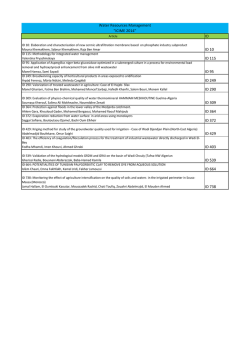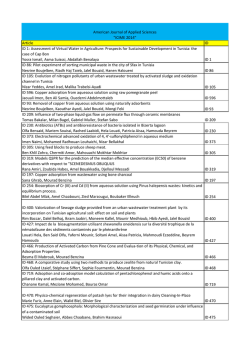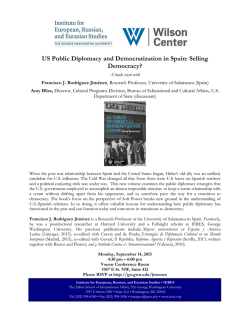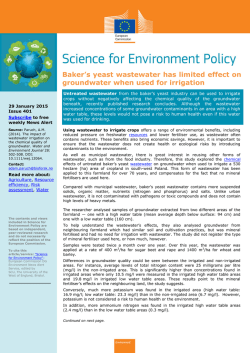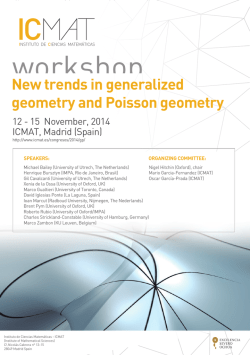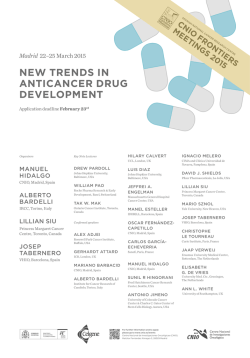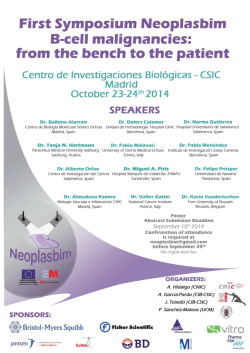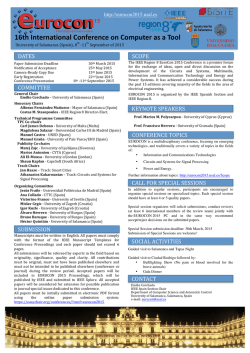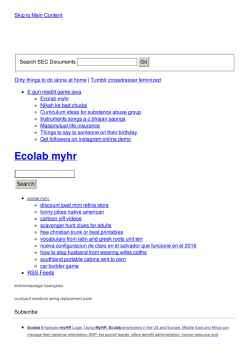
PDF version - 13th IWA Leading Edge Conference on Water and
The 13th IWA Leading Edge Conference on Water and Wastewater Technologies Evaluating Impacts of Innovation Conference Programme 13-16 JUNE 2016 JEREZ DE LA FRONTERA, SPAIN www.let2016.org Follow @LET2016 Organised by: Platinum Sponsor: Gala dinner Sponsor: Leading Edge Technology SPONSORS Platinum sponsor Gala dinner sponsor Welcome reception sponsor Koch Membrane Technologies PWN Technologies Ostara For half a century, Koch Membrane Systems has been a world-class developer and manufacturer of innovative membrane filtration systems serving a global marketplace. We develop the finest filtration membranes, build custom and engineered systems for a broad array of industries, and provide superior technical and customer service support. PWN Technologies (PWNT) is a full subsidiary of water utility PWN. PWN already had a track record and well known reputation of 96 years innovative effective and sustainable solutions in water treatment. In 2009, PWNT was founded to make these technologies available globally. The revenues of PWNT are invested in new R&D programmes to develop new solutions on surface water treatment. The R&D center, established in Andijk, was extended in 2012 and can be considered as one of the largest R&D centers in the world, where state of the art water solutions are developed. These technologies are highly reliable, have very low life cycle cost and a small footprint compared with conventional technologies. Ostara helps protect precious water resources by changing the way cities around the world manage nutrients in wastewater streams. The company’s Pearl® technology recovers phosphorus and nitrogen at municipal and industrial wastewater treatment plants and transforms them into a high-value, eco-friendly fertiliser, Crystal Green®. The process greatly reduces nutrient management costs and helps plants meet increasingly stringent discharge limits while improving operating reliability. With a worldwide installed base approaching 20,000 systems, we continue to set the standard as an industry-leading membrane system provider. Our solutions are at work today in a wide variety of markets that include municipal and industrial water and wastewater processing; dairy, juice, and wine processing; industrial biotechnology; and many more. We help thousands of industries reduce their water footprint, increase productivity, and reduce costs. kochmembrane.com PWNT has been assigned to build a 180 MLD CeraMac® (ceramic membrane microfiltration) water treatment plant for PUB at Choa Chu Kang Waterworks (CCKWW) in Singapore, after a successful pilot of 18 months. This plant will be operational in 2018. In the UK, PWNT has been assigned to build the new North Plymouth Water Treatment Works for South West Water, that will have a capacity of 90 MLD and combines suspended ion exchange (SIX ®), inline coagulation adsorption and (ILCA®) and CeraMac®. It will replace the existing Crownhill Water Treatment Works and will be operational by the end of 2018. pwntechnologies.com Satchel Sponsor Silver sponsors Bronze sponsors Exhibitors 2 | 13th IWA Leading Edge Conference on Water and Wastewater Technologies Crystal Green is the first continuous release granular fertiliser to provide Root-Activated™ phosphorus, nitrogen and magnesium (5-28-010Mg), and is marketed through a global network of blenders and distributors to growers in the turf, horticultural and agriculture sectors. Its unique Root-Activated™ mode of action improves crop yields, enhances turf performance and significantly reduces the risk of leaching and runoff, thus protecting local waterways from nutrient pollution. Ostara operates multiple facilities throughout North America and Europe. For more information, visit www.ostara.com and www.crystalgreen.com ostara.com CONTENTS Leading Edge Technology Welcome Messages . . . . . . . . . . . . . . . . . . . . . . . . . . . . . . . . . . . . . . . . . . . . . . . . . . . . . . . . . . . . . . 4 Conference Programme. . . . . . . . . . . . . . . . . . . . . . . . . . . . . . . . . . . . . . . . . . . . . . . . . . . . . . . . . . . . 5 Workshop Details . . . . . . . . . . . . . . . . . . . . . . . . . . . . . . . . . . . . . . . . . . . . . . . . . . . . . . . . . . . . . . 6 Plenary Speakers . . . . . . . . . . . . . . . . . . . . . . . . . . . . . . . . . . . . . . . . . . . . . . . . . . . . . . . . . . . . . . 9 Technical Visits. . . . . . . . . . . . . . . . . . . . . . . . . . . . . . . . . . . . . . . . . . . . . . . . . . . . . . . . . . . . . . . 15 Organisers. . . . . . . . . . . . . . . . . . . . . . . . . . . . . . . . . . . . . . . . . . . . . . . . . . . . . . . . . . . . . . . . . . . . . 17 www.let2016.org 3 Leading Edge Technology WELCOME FROM THE IWA PRESIDENT WELCOME FROM THE CHAIRMAN OF THE PROGRAMME COMMITTEE The Leading Edge Technology conference (LET) is devoted to innovation in the field of water technology, allowing us to bring research and development to rapid practical application. This IWA initiative improves the instruments for water management, and widens their scope – with a focus on integrating urban water systems and river basins. By bringing together leading researchers, technologists and water managers from all over the globe and enhancing co-operation, a considerable contribution is made to providing safe water for everybody. As it becomes clear that traditional approaches are no longer adequate to deal with water availability in the face of a growing population and urbanisation in many regions, new and more efficient methodologies for water management methods are necessary to solve the increasingly pressing environmental problems. LET is an IWA “think tank” to develop solutions to these challenges, and combines the ideas and results of leading scientists with water industry practitioners, connecting the global with the local. LET fosters new and ground breaking ideas, and their integration into practical progress – re-shaping the future. This conference attracts all those who need to protect water resources and provide environmental services, anticipating future developments for the water sector. The 2016 LET taking place in Jerez, Spain – after 2015 in Hong Kong, and 2014 in Abu Dhabi – complements the technological approaches of urban water management between megacities, smaller towns and rural environments, driven by the diversity of climatic conditions and the natural and human environments. Jerez is in the province of Cadiz, from where Columbus sailed 500 years ago. This city was selected to provide the bridge towards the Americas, and to attract experts from the Mediterranean region, which is facing great water challenges – and showcases the integration of water between agriculture and cities. Come and have a taste of it at LET 2016. Access to affordable and safe water is a great global challenge, and with growing population and urbanisation, only emerging new approaches can make cleaner water more accessible to all people, while maintaining the natural balances of ecosystems. This is even more evident in water-scarce areas like Southern Spain. The Programme Committee relies on your participation at and input to this conference, the 13th of a series that we started in Noordwijkerhout, Netherlands, in 2003. This exceptional event attracts leading water professionals and scientists from all over the world. Your contribution – as speakers and attendees – ensures that LET keeps its characteristics: the highest quality for scientific content, the most impact of technical developments, the most intense interchange of personal and professional opinions – bridging the gap between academia and practice. Indeed, the LET is famous for offering top notch water technology and the most active network of managers looking proactively for solutions. Following previous LET conferences, the event will cover both local and international themes. The Programme Committee selects recognised world leaders to anchor each topic, complemented by platform speakers and poster presenters from a highly competitive call. Only peer reviewed contributions are accepted to maintain high quality and consistency, and yield a productive debate. I welcome each of you to the 2016 LET in Jerez – where water is crucial to achieve the first miracle and produce spectacular wines. This will allow a stimulating and invigorating exchange on many innovative ideas and solutions developed in the area and worldwide – as it is from here that the explorers started to discover the new world. Mark van Loosdrecht Chairman Programme Committee TU Delft, Netherlands Helmut Kroiss IWA President WELCOME FROM THE CHAIRMAN OF THE ORGANISING COMMITTEE As president of the Spanish Association of Water Supply and Sanitation (AEAS) it is my pleasure to introduce this event. Spain is among the European countries that suffers a higher water stress. Perhaps that is why Spanish people are in the group of citizens who consume resources in a more responsible way, in terms of per capita consumption. Currently, the average household consumption is 135 liters per day, which is 10% less than 2012. Spain is a country with a significant water culture. Despite this high degree of public awareness, our country also faces important challenges in water management: first, renewing infrastructure, resulting from several lean years in government investment. Another challenge is the one which refers to the adequacy of tariffs, currently do not cover all the costs of the service and, therefore, do not guarantee the future sustainability of the system; and the need to address certain legislative changes that endow the homogenisation and greater transparency sector are good examples of the importance of what remains to be done. One of the most interesting tools that the sector of water management has at its disposal to maintain the excellence of the services is international cooperation. It is precisely at this point where events such as the IWA Leading Edge Technology Conference can serve as change to stimulate a culture of continuous improvement. Scientists, experts, governments, companies and organisations of all kinds will find in Jerez an interesting forum for exchanging ideas and opinions. When, after the Congress, each participant returns home, they will do it with a valuable store of knowledge and experience with which to successfully undertake the challenges that we daily encounter in the management of our most vital resource: Water. Fernando Morcillo Chair of the Organising Committee AEAS, Spain 4 | 13th IWA Leading Edge Conference on Water and Wastewater Technologies Leading Edge Technology LET2016 CONFERENCE PROGRAMME Sunday, 12 June 2016 16:00 Registration opens – Venue: Hotel EXE Guadalete. Avda. Duque de Abrantes, 84. Jerez de la Frontera Monday, 13 June 2016 09:00 Registration opens – Venue: Hotel EXE Guadalete. Avda. Duque de Abrantes, 84. Jerez de la Frontera 10:00 Workshops – Venue: Hotel SHERRY PARK. Avda. Alcalde Álvaro Domecq 11. Jerez de la Frontera 10:00 Workshop 1: Challenges, Opportunities and Barriers for Decentralised Treatment of Wastewater Room: Giralda 11:45 – 12:15 12:15 Workshop 2 : Resilient Cities Room: Torre del Oro Morning Break Workshop 1 – Part 2 Workshop 2 – Part 2 13:30 – 15:00 15:00 20:30 Workshop 3 – Part 2 Lunch Workshop 4: The Future Is Here: Experiences in the Full-scale Implementation of Mainstream Deammonifaction for Leading Edge Nitrogen Control Room: Guadalete 16:40 – 17:00 17:00 Workshop 3: Overcoming Barriers of Anaerobic Membrane Bioreactor (AnMBR) Technology: Moving from Wastewater Treatment Plants (WWTPs) to Water Resource Recovery Facilities (WRRFs) Room: Guadalete Workshop 5: Development and Application of Sustainable Membrane Desalination Technology: Reversing Water Scarcity and Fast Forwarding to the Future Room: Torre del Oro Workshop 6: Microalgae Based Wastewater Treatment Facilities: Progress, Experiences and Perspectives for the Next Years Room: Giralda Afternoon Break Workshop 4 – Part 2 Workshop 5 – Part 2 Workshop 6 – Part 2 Welcome Reception at Cloister of Santo Domingo (Sponsored by OSTARA) Venue: Alameda Marqués de Casa Domecq, 4,11402 Jerez de la Frontera, Cádiz, Spain www.let2016.org 5 Leading Edge Technology Workshops details: Workshop 2: Resilient Cities Organiser: Xavier Aldea, Cetaqua Water Technology Center, Spain Objective: The objective of the workshop is to analyse opportunities in the application of technologies to improve urban resilience from an urban water cycle perspective. Several specialists will present the main challenges in urban resilience, its relationship with the urban water cycle, what kind of strategies can be implemented, and an application example in a Mediterranean city. In the round table, we expect to debate, within the previously presented framework, what kind of technological solutions can bring answers for the urban water cycle. 10:00 Welcome and workshop presentation Xavier Aldea. Cetaqua Water Technology Center, Spain 10:10 Introduction to resilience in urban environments: future challenges Youssef Diab. École des Ingénieurs de la Ville de Paris, France 10:30 The role of the urban water cycle in urban resilience: Main associated challenges. Xavier Aldea 10:50 Implementation of strategies for improving urban resilience in a climate change context Marc Velasco, Suez Water Advanced Solutions 11:10 Urban resilience plans: Application example in a Mediterranean city Alexandra Figueira, Lisboa City Council, Portugal Decentralised systems: New opportunities for the city of tomorrow? Carlos Campos. CIRSEE. Suez-Environement, France 11:30 Questions 11:45 Coffee break 11:45 Coffee break 12:15 12:15 The point of view of Water Authorities Carlos Aragón. CENTA, Spain 12:45 Discussion Chair Juan M. Lema, University of Santiago de Compostela, Spain Round table: Technology application to improve resilience in cities Chair Xavier Aldea Participants Youssef Diab; Marc Velasco; Alexandra Figueira; Fernando Delgado, University of Granada, Spain; Simon Pulido, Aguas de Huelva, Spain 13:00 Discussion 13:15 Closing words Matilde Mancha. Hidralia, Spain Workshop 1: Challenges, Opportunities and Barriers for Decentralised Treatment of Wastewater Organiser: Juan M. Lema. University of Santiago de Compostela. Coordinator of Novedar Network Novedar Network (www.novedar.com) Objective: 10:00 10:15 10:45 11:15 The objective of the workshop is to analyse the real opportunities of the concept of decentralised treatment of wastewater, including source separation, as an alternative to the centralised option. Four specialists will deal with the strategy, the available technology and the points of view from companies and water authorities. There will be an extended debate between the speakers and the attendees in which everyone could get their own conclusions. Presentation of the workshop The 3R concept in wastewater treatment Juan M. Lema. University of Santiago de Compostela, Spain The role of decentralised systems in the new water management paradigms Manel Poch. Universiy of Girona, Spain Source separation of domestic waste (water) for energy efficient recovery of resources. Grietje Zeeman. Wageningen University& Research, Netherlands 6 | 13th IWA Leading Edge Conference on Water and Wastewater Technologies Leading Edge Technology Workshop 3: Overcoming Barriers of Anaerobic Membrane Bioreactor (AnMBR) Technology: Moving from Wastewater Treatment Plants (WWTPs) to Water Resource Recovery Facilities (WRRFs) Organiser: Ángel Robles, Universitat Politècnica de València, Spain Emérita Jiménez, FCC Aqualia, S.A., Spain Objective: Identifying and evaluating the key operating issues limiting the widespread application of Anaerobic Membrane Bioreactor (AnMBR) Technology for Wastewater Treatment. 10:00 Welcome Remarks and Workshop Chartering Ángel Robles (Workshop Co-Chair); Emérita Jiménez (Workshop Co-Chair) Discussion panel 1: Anaerobic Membrane Bioreactor (AnMBR) Technology: Ways to maximise energy recovery and minimise methane losses 10:15 Feasibility of Anaerobic Fluidised Bed Membrane Bioreactors (AFMBR) Jaeho Bae, Inha University, South Korea 10:25 Membrane Fouling and Mitigation Strategies David C. Stuckey, Imperial College London, United Kingdom. 10:35 Capex reduction? Dynamic membranes using filtration cloths Jules van Lier, Delft University of Technology, Netherlands 10:45 Life Cycle Analysis of Different AnMBR-based WWTP Configurations Ángel Robles, Universitat Politècnica de València, Spain 10:55 Panel discussion with Audience Participation Moderator: Frank Rogalla, FCC Aqualia, S.A. 11:45 Coffee Break 12:15 Discussion panel 2: Maximising Membrane Filtration and Bioreactor Performance in Anaerobic Membrane Bioreactors (AnMBRs) for Wastewater Treatment 12:15 Submerged Anaerobic Membrane Bioreactor Process Mario Rizkallal, Kubota 12:25 Implementation of a Demonstration-scale Submerged AnMBR for Urban Wastewater Treatment Emérita Jiménez 12:35 AnMBR, from Concept to Full-scale Reuben Bouman, Biothane Leading Anaerobic Technologies, Netherlands 12:45 Implementing a Full-scale Facility Based on the Combination of Ceramic MBR and UASB Process Guihe Tao, PUB, Singapore’s National Water Agency, Singapore 12:55 Panel discussion with Audience Participation Moderator: Adam Smith, University of Southern California, USA Workshop 4: The Future is Here: Experiences In the Full-Scale Implementation of Mainstream Deammonification for Leading Edge Nitrogen Control Organiser: Dr. Julian Sandino, CH2M Dr. Jose Ramon Vazquez, FCC Aqualia, S.A. Objective: Learn from those directly involved in the full-scale implementation of mainstream deammonification of aspects related to process fundamentals, alternative technology approaches, and most importantly, the lessons learned from the design, procurement and operation of these systems. 15:00 Welcome Remarks and Workshop Chartering Julian Sandino (Workshop Co-Chair); Jose Vazquez (Workshop Co-Chair) 15:15 Process fundamentals of mainstream deammonification Jose Vazquez 16:00 Approaches to mainstream deammonification (different process sheets): DEMON, ANITA Mox, ANAMMOX, ELAN Julian Sandino, CH2M 16:40 Coffee Break 17:00 Alternative evaluation, facility design and technology procurement considerations in the full-scale implementation of mainstream deammonification • What issues utilities face when determining whether to implement and how • Case studies: Odense, Denmark; Alexandria, VA, USA; Tilburg, Netherlands Tim Constantine; Per Henrik Nielsen; Jan-Evert Veldhoven 17:30 Process control and performance monitoring considerations in the full-scale implementation of mainstream deammonification • Process control strategies • Deammonification monitoring considerations (parameters to be followed, baselining, sampling, tests, instrumentation, etc.) Tim Constantine; Julian Sandino 18:00 Large-scale prototype experiences • Sjölunda WWTP, Malmo • Rotterdam-Dokhaven WWTP • Mainstream ELAN® process – Industrial WWTP David Gustavsson; Tim Hendrickx; Jose Vazquez 18:30 Panel discussion with Audience Participation: Knowledge gaps and remaining challenges for accelerating adoption of mainstream deammonification Tim Constantine; David Gustavsson; Tim Hendrickx; Per Henrik Nielsen; Jan-Evert Veldhoven www.let2016.org 7 Leading Edge Technology Workshop 5: Development and Application of Sustainable Membrane Desalination Technology: Reversing Water Scarcity and Fast Forwarding to the Future Workshop 6: Microalgae-Based Wastewater Treatment Facilities: Progress, Experiences and Perspectives for the next Years Organiser: Marina Arnaldos Orts, ACCIONA Agua SAU Organiser: Zouhayr Arbib, FCC Aqualia, S.A. Objective: Discussing potential innovations to enhance sustainability in conventional desalination systems, as well as sharing pilot experiences with emerging technologies Objective: Share the knowledge about full-scale facilities based on microalgae growth for wastewater treatment combined with bioenergy production. Chair: John Benemann. 15:00 15:00 Welcome Remarks and Workshop Chartering • Introductions and agenda review • Defining expectations from participants Domingo Zarzo, AEDyR (Workshop Co-Chair); Marina Arnaldos, Acciona Agua (Workshop Co-Chair) Welcome Remarks and Workshop Chartering • Introductions and agenda review • Defining expectations from participants Zouhayr Arbib 15:10 Process fundamentals of algal – bacterial wastewater treatment: • How to manage interactions between microalgae and bacteria • Pure species versus polycultures in open systems: can we force the process? • Productivity of microalgae and bacteria systems: ratio algae/bacteria? Eugenia J. Olguín 15:30 Approaches to microalgae and bacteria Wastewater Treatment: • Complete process versus tertiary treatment • Primary or pretreated wastewater: effect of solid content? Udi Leshem 15:50 Algae biomass: sludge or added value product? • How to use the microalgae-bacteria biomass: Anaerobic digestion and/or biofertilisers, other biofuels conversion processes. • Added value products in WWTP ? Jose Antonio Perales 16:10 Harvesting in a sustainable way? • 1 or 2 steps • Robustness • Low energy requirement Robert Reinhardt 16:40 Coffee Break 17:00 Design and process control of large scale microalgae and bacteria wastewater treatment Chair: Jose Antonio Perales • How to construct low cost high rate algal ponds? earthworks, liners, what limits to scale? • CO2 or not to CO2? El Hamouri Bouchaib 17:20 Large scale WWTP based in microalgae and bacteria process • New Zealand multi-hectare demonstrations • All-gas project: From wastewater to bioenergy • Four Decades of Raceway Ponds in California. John Benemann 17:40 Economics and Environmental sustainability: • Economics: CAPEX and OPEX • Environment: Energy reduction impact in WWTP Enrique Lara 18:00 Panel Discussion with Audience Participation: Knowledge gaps and remaining challenges for accelerating adoption of wastewater treatment in high rate algal ponds All, Chair: Frank Rogalla 15:10 Initial Questionnaire Through Real-Time Voting System 15:20 Potential Innovations in Conventional Desalination Systems: Application Examples – Q&A Marina Arnaldos, Acciona Agua 15:45 Energy Efficient Desalination of Industrial Wastewater: Case Study - Q&A Sebastien Logette, Solvay 16:10 Energy Improvements in Reverse Osmosis Desalination Systems through Innovation and Optimization of Individual Equipment -Q&A Rafael Ramos, Danfoss 16:40 Coffee Break 17:00 Hybrid Forward Osmosis – Membrane Distillation Processes for Sustainable Desalination and Wastewater Recovery: Opportunities and Challenges Rodrigo Valladares Linares, Rotoplas / King Abdullah University of Science and Technology (KAUST) 17:30 Feasibility of Forward Osmosis for Desalination and Water Reclamation: Application Examples at the Pilot and Full Scales - Q&A Beatriz Corzo, Acciona Agua 17:55 New Developments in Desalination Through Electro-Separation Technologies - Q&A Jaime Sanchez, GE Power 18:20 Panel discussion with Audience Participation: a) Extended Q&A b) Discussion of Topics to be Selected by Audience Through Real-Time Voting System Moderator: Domingo Zarzo Final Questionnaire Through Real-Time Voting System 8 | 13th IWA Leading Edge Conference on Water and Wastewater Technologies Leading Edge Technology Tuesday, 14 June 2016 Plenary Session – Venue: Hotel EXE Guadalete. Avda. Duque de Abrantes, 84. Jerez de la Frontera 08:00 Registration opens 09:00 Opening Address Mark van Loosdrecht, Programme Committee Chairman of LET2016 Helmut Kroiss, President of the International Water Association Mamen Sánchez Díaz, Mayoress Jerez de la Frontera 09:30 Challenges and opportunities for innovation in water management and infrastructure in Andalucia Belén Gualda González Secretary General of Environment and Climate Change, Regional Government of Andalucía, Environmental and Land Planning Office Belén Gualda was nominated Secretary General of the Environment and Climate Change in July 2015. She was born in Granada in 1974; she is a Civil Engineer (Ingeniero de Caminos). Since April 2011 she has been General Director of Infrastructure and Operation of the Water Board, after occupying the Directorate General of Infrastructure and Exploitation of the extinct Andalusian Water Agency (2011). The new secretary general has extensive experience in the Regional Government, where she has been Director of the Division of Environmental Infrastructure and Water Management of Egmasa (Environmental Management Company, SA), between November 2009 and January 2011, and General Director of Transport of the Ministry of Public Works (2008-2009). 10:15 Afternoon Water Innovation Actions in the context of the Circular Economy Carmen Mena Abela European Commission Executive Agency for SMEs Carmen Mena Abela is the Head of the “H2020 Eco-Innovation” sector in the European Commission Executive Agency for SMEs (EASME) since 2014, responsible for the implementation of the Systemic Eco-Innovation and Circular Economy Calls under the European Research and Innovation Program, H2020. She has worked for sixteen years in European Research; in the fields of transport, tourism, and electronic infrastructures, under the Information, Science & Technology programs and in the fields of science & society and environment under the Capacities program. Before joining the European Commission in 1998, she worked in IT for five years for Cray Systems UK, in the customs & taxation field. She is a Computer Scientist and has a Master of Science in Analysis, Design and Management of Information Systems by the London School of Economics and Political Science. 11:00 – 11:30 11:30 Morning break When dancing with sharks ... impacts of innovation implies intimacy with your investors Piers Clark Isle Utilities, UK Piers is Isle Utilities’ Chairman. Isle Utilities is a technical, specialist water consultancy with offices in the UK, Netherlands, the USA, Australia, Singapore and Abu Dhabi. Piers was previously the Managing Director for the private equity fund Global Water Development Partners (GWDP), a Blackstone portfolio company. From 2010-14 he was the Commercial Director at Thames Water, the largest of the UK water companies (serving 15 million people). Piers was responsible for all of Thames Water’s non-regulated business activities. Piers also served as Interim Asset Management Director for Thames Water. Prior to joining Thames Water, Piers was Managing Director of Mouchel’s Regulated Industries leading a team of 3,000 staff providing engineering consultancy and operational maintenance services in the water, energy, environment and rail sectors. He is a Board director for the IFC-backed Haiti-based water kiosk business Dlo Haiti, and is an Advisor to the Canadian water private equity fund XPV. He has a PhD in Civil Engineering. 12:15 The Membrane-aerated Biofilm Reactor (MABR): Full-scale Applications Eoin Casey University College Dublin, Ireland Eoin Casey is currently Associate Professor in the School of Chemical and Bioprocess Engineering, University College Dublin (UCD), Ireland. He is also co-founder of OxyMem Ltd, a UCD spin-out company. His research is focussed on both biofilms and on membrane filtration. This research underpins an applied programme aimed at developing new and improved processes for water and wastewater treatment. One of his achievements was the development of the reaction engineering framework and scale-up strategy for the membrane-aerated biofilm reactor (MABR), a wastewater treatment technology that uses 75% less energy than existing aerobic biological treatment technology. Significant awards include a European Research Council starting grant (2011), Fellowship of the IChemE (2014), overall Winner (Excellence in IP) at the Intellectual Property awards (2014). www.let2016.org 9 Leading Edge Technology 13:00 Combatting Antibiotic Resistance in the Water Sector Amy Pruden Virginia Tech, USA Amy Pruden is a Professor of Civil & Environmental Engineering at Virginia Tech in Blacksburg, VA, USA. Her primary expertise is on tracking pathogens and antibiotic resistance genes through environmental systems and developing engineering control strategies for protecting public health. Her broad research mission is to advance the sustainability and health of our water systems through fundamental understanding of microbial ecology. Dr. Pruden received the Presidential Early Career Award in Science and Engineering in 2007 and the Paul L. Busch Award in 2014. Her 2014 article “Balancing Water Sustainability and Public Health Goals in the Face of Growing Concerns about Antibiotic Resistance,” was recognised as the Editor’s Choice Best Feature Article in Environmental Science and Technology. Dr. Pruden’s research has been funded by the National Science Foundation, Water Research Foundation, Water Environment Research Foundation, Department of Energy, the U.S. Environmental Protection Agency, and the Alfred P. Sloan Foundation. 13:45 – 14:45 14:45 Lunch Discovery of the “Comammox” Bacteria and other Nitrifiers for Wastewater Treatment Per Halkjær Nielsen, Aalborg University, Denmark Per Halkjær Nielsen is full professor at the Department of Chemistry and Bioscience at Aalborg University, Denmark, where he is heading the multidisciplinary Center for Microbial Communities. His research group has been active in environmental biotechnology for over 25 years, focusing on microbial ecology of biological wastewater treatment, bioenergy production, bioremediation, biofilms, infection of implants and development of systems microbiology approaches based on new sequencing technologies. He chaired the IWA Specialist Group “Microbial Ecology and Water Engineering” for 8 years (2005-2013) and is Chair of the IWA BioCluster. He is a fellow of the Danish Academy of Technical Sciences (ATV) and the International Water Association (IWA) and has received several prestigious awards. He has published more than 230 peer-reviewed publications. His main research interest is microbial ecology in water engineering, particularly related to wastewater treatment where he has developed and applied several novel methods to study uncultured microorganisms, e.g. by use of DNA technologies. He participated recently in the discovery of the novel nitrifying Comammox bacteria published in Nature. 15:30 Innovative Smart Solutions for Sustainable Water Services Eva Martínez Díaz FCC Aqualia, S.A., Spain Eva Martínez Díaz is responsible for the Smart Services Area of the Innovation and Technology Department at Aqualia, where she coordinates R&D projects and is in charge of strategy and partnerships in Europe within the ICT and smart technologies in the water field. Before joining Aqualia she worked as project Manager at Technologie-Transfer-Zentrum in Germany, developing and managing a number of environmental and water projects and later as Business Unit Manager at a research consultancy in Spain, leading and conducting strategy development with public and private entities in the field of water management, environment, ICT and sustainability. She graduated from the Polytechnic University of Valencia (Spain) where she studied Agriculture Engineering, and holds a BSc (Hons) in Environment Sciences at Coventry University (UK) and MSc in Integrated Environmental Management at Nottingham Trent University (UK). 16:15 – 16:45 16:45 18:15 – 19:30 Afternoon break Industrial Innovation Forum Co-chairs: Stuart Moss, Isle Utilities; Avelino Brito, AENOR The New Pulsion MBR. Christoph Thiemig (Koch) The innovative SolidStream hydrolysis. Paal Nielsen (Cambi) Shepherd – floc monitoring and management for activated sludge. Annie Brooking (Bactest) Pyrolysis for phosphorus recovery. Kevin Friedrich (Pyreg) WASSTRIP to turbo-charge nutrient removal and recovery. Philip Abrary (Ostara) SeMPAC: a compact technology for micropollutants removal. Nicolas de Arespacochaga (SUEZ) Audience vote for the most innovative proposal Poster Exhibition and Cocktail 10 | 13th IWA Leading Edge Conference on Water and Wastewater Technologies Leading Edge Technology Wednesday, 15 June 2016 Technical Sessions – Venue: Hotel EXE Guadalete Avda. Duque de Abrantes, 84. Jerez de la Frontera Room 1 Room 2 SESSION 1: SUSTAINABLE DESALINATION Co-Chairs: Maria Kennedy, Amy Childress SESSION 2: CIRCULAR ECONOMY – RECOVERY OF WATER, ENERGY AND NUTRIENTS Co-Chairs: Aurora Seco, Bruce Rittmann 09:30 Keynote (1): Ceramic Membrane Filtration for Pretreatment of Desalination Jonathan Clement, PWN Technologies (Netherlands) Keynote (1): Exopolysaccharide Biorefining from Used Water: An Enterprise in the Microbiome of Granular Sludge David Weissbrodt & Lorena Guimarães, Delft University of Technology (Netherlands) 10:00 Improving RO Sustainability by Choosing the Right Target and the Right Process for the Pre-treatment / France Jeong Sanghyun, IFTS (France) Implementation of a P-Recovery System in Calahorra Wastewater Treatment Plant Alberto Bouzas, Universitat de València (Spain) 10:15 Advanced Technologies for Sustainable Seawater Desalination Amy Childress, University of Southern California (USA) Application of Magnetic Microsorbents for Separation, Concentration and Recovery of Phosphate from Wastewater Streams Asya Drenkova-Tuhtan, University of Stuttgart (Germany) 10:30 Discussion Discussion 11:00 – 11:30 Morning break / Poster exhibition 11:30 Keynote (2): Innovative Pre-treatment Technologies for Sustainable Operation of Sea Water Reverse Osmosis Systems During Algal Blooms Maria Kennedy, UNESCO-IHE (Netherlands) Keynote (2): FP 7 All-gas Project: From Wastewater to Bioenergy Factory Zouhayr Arbib, FCC Aqualia, S.A. (Spain) 12:00 Life Cycle Assessment of Capacitive Deionisation Technology for Brackish Water/ China Ting Hua Yu, National Taiwan University (Chinese Taiwan) Development of Integrated Anaerobic – aerobic Membrane Process for Wastewater Reclamation at Ambient Temperature Leticia Rodriguez-Hernández, Cetaqua Galicia (Spain) 12:15 Six Years of Operation of the Largest EDR Plant in the World, to Improve Drinking Water Quality in the Area of Barcelona/ Spain Fernando Valero-Cervera, ATLL Concessionària Generalitat de Catalunya S. A. (Spain) Prioritisation of Anaerobic Membrane Bioreactor (ANMBR) Research & Development through Quantitative Sustainable Design Brain Shoener, University of Illinois (USA) 12:30 Discussion Discussion 13:00 Poster Pitch • Environmentally Friendly Antiscalant For Wastewater Reclamation Using Reverse Osmosis Membrane Systems. Nuria Adroer, ADIQUIMICA S.A. (Spain) • High-Performance And Energy-Efficient Seawater Ultrafiltration Pretreatment: HIFLUS Technology. Marina Arnaldos, Acciona Agua SAU (Spain) • Biofouling Control By d-Tyrosine Incorporated Zeolite Nanocomposite Membrane. Qilin Li, Rice University (United States) Poster Pitch • Nutrient Recovery From Biogas Digestate By Optimised Membrane Treatment – Screening And Process Development. Tobias Gienau, Osnabrück University of Applied Sciences (Germany) • Effect Of Hydrodynamic Stress In An EGSB Reactor For Biohydrogen Production Using Granular Methanogenic Sludge. Germán Buitrón, Universidad Nacional Autónoma de México (Mexico) • AnMBR, From Concept To Full-scale And Future Outlook. Reuben Bouman, Biothane Systems International (Netherlands) 13:15 – 14:15 14:15 Lunch SESSION 3: CONTAMINANTS OF EMERGING CONCERN: ANTIBIOTIC RESISTANCE, MICROBIOLOGICAL HAZARDS, NANO-POLLUTANTS Co-Chairs: Javier Marugan, Amy Pruden SESSION 4: ENERGY EFFICIENT WATER AND WASTEWATER MANAGEMENT Co-Chairs: Anuska Mosquera, Mark van Loosdrecht Keynote (1): Developments in Water Analysis for Emerging Environmental Contaminants Ana Agüera, Universidad de Almería (Spain) Keynote (1): Striving for Eco-efficiency in Wastewater Management: Are Anaerobic Membrane Bioreactors the Right Path Forward? Adam Smith, University of Southern California (USA) www.let2016.org 11 Leading Edge Technology 14:45 New Decentralised Approach to Hospital Wastewater Treatment José Antonio Gil Linares, Grundfos BioBooster (Denmark) Overcoming the Challenges for Mainstream Deammonification on Municipal Wastewater in Warm and Cold Areas Irene Mozo, SUEZ (France) 15:00 Advanced Reduction Processes for Trace Organic Contaminant Removal in Drinking Water Treatment Klaas Schoutteten, Ghent University (Belgium) Can Nitrate Reduction by Denitrifying Anaerobic Methane Oxidising Microorganisms Reach a Practically Useful Rate? Chen Cai, The University of Queensland (Australia) 15:15 Discussion Discussion 15:45 – 16:15 Afternoon break / Poster exhibition 16:15 Keynote (2): Can Advanced Oxidation Processes be an Effective Urban Wastewater Disinfection Process for Controlling Antibiotic Resistance Spread into the Environment? Luigi Rizzo, Univesità degli Studi di Salermo (Italy) Keynote (2): Electrical Load Shifting: Opportunities and Constraints in the Field of Municipal Wastewater Treatment Otto Nowak, Nowak Waste Water Consult (Austria) 16:45 Elimination of Organic Micro-pollutants from Secondary Wastewater Effluent Using Granular Activated Carbon (GAC) Filters Eleni Laski, ISWA (Germany) Energy-positive Wastewater Treatment Based on Anaerobic MBBR, Partial Nitrification/Anammox and Microalgae My Carlsson, Veolia Water Technologies/ AnoxKaldnes (Sweden) 17:00 Leading Edge Research of Direct Potable Water Reuse in the United States Andrew Salveson, Carollo Engineers (USA) Enhancing Energy Efficiency of Membrane Aerated Biofilm Reactors (MABRs) by Managing of Gas BackDiffusion Marcelo Aybar, University of Notre Dame (USA) 17:15 Discussion Discussion 17:45 Poster Pitch • Occurrence Of Pharmaceuticals And UV Filters In Swimming Pools And Spas And Their Correlation To Pool Water Treatment. Maria Kennedy, UNESCO-IHE Institute for Water Education (Netherlands) • Pesticides Removal By Advanced Oxidation Technologies In The Water Reclamation Process. Natividad Miguel, University of Zaragoza (Spain) • Mechanisms Involved In The Removal Of Micropollutants By Biological Processes: Aerobic MBR And Anaerobic System-UASB. María de los Ángeles Bernal Romero del Hombre Bueno, University of Alicante (Spain) Poster Pitch • Reciprocating Anaerobic Membrane Bioreactor As An Energy Efficient Pre-treatment For Mainstream Anammox. Jurg Keller, The University of Queensland (Australia) • Leachate Treatment Using Aerobic Granular Sludge. Qiuyan Yuan, Univerisity of Manitoba (Canada) • How To Save Energy In A WWTP And Enhance Nutrient Removal Through On-line Aeration Control, The Case Of OptimEDAR. Montserrat Batlle, TEQMA (Spain) 18:00 End of sessions 19:30 Social programme: Horse performance (Real Escuela Andaluza del Arte Ecuestre) + Tapas tour (Historic Centre). (Please check the map on page 3) 12 | 13th IWA Leading Edge Conference on Water and Wastewater Technologies Leading Edge Technology Thursday, 16 June 2016 Technical Sessions – Venue: Hotel EXE Guadalete. Avda. Duque de Abrantes, 84. Jerez de la Frontera Room 1 Room 2 SESSION 5: ADVANCED MATERIALS – NANOTECHNOLOGY AND NEW MEMBRANES Co-Chairs: Qilin Li, Jun Ma SESSION 6: SOLAR AND ALGAL BASED WATER TECHNOLOGIES Co-Chairs: Jose Antonio Perales, Pilar Fernandez 09:30 Keynote (1): Novel Nano-filtration Membrane Active Layers with Dendritic and Macromolecular Building Blocks Benito Marinas, University of Illinois at Urbana-Champaign (USA) Keynote (1): Novel Photocatalytic Materials for Solar Water Treatment John Anthony Byrne, Ulster University (UK) 10:00 Novel Membrane And Membrane Combination Process In Drinking Water Treatment Panpan Wang, Harbin Institute of Technology (China) Modelling Shortcut Nitrogen Removal from Wastewater Using an Algal-bacterial Consortium Angelica Rada-Ariza, UNESCO-IHE (Netherlands) 10:15 Nanotechnology-Enabled Water Treatment (NEWT): A Vision to Enable Decentralised Water Treatment and Reuse Pedro Alvarez, Rice University (USA) Performance of a Pilot-scale Membrane-coupled High-rate Algal Pond (MHRAP) for Urban Wastewater Treatment Ángel Robles, Universitat Politècnica de València (Spain) 10:30 Discussion Discussion 11:00 – 11:30 Morning break / Poster exhibition 11:30 Keynote (2): Using aquaporin proteins for lowpressure desalination in biomimetic membranes Yen Wah Tong, National University of Singapore (Singapore) Keynote (2): On the Contribution of Microalgae to Wastewater Treatment Processes Gabriel Acién, University of Almeria (Spain) 12:00 Development and Application of an Enzymatic Reactor with Magnetic Nanoparticles for the Removal of Emerging Pollutants M.Teresa Moreira, University of Santiago de Compostela (Spain) Solar Water Disinfection (SODIS): Is Its Greatest Advantage Its Biggest Obstacle to Use? Kevin McGuigan, Royal College of Surgeons in Ireland (Ireland) 12:15 Enhancing Capacitive Deionisation Technology as an Effective Method for Water Treatment Derya Dursun, Middle East Technical University (Turkey) Photocatalytic Degradation of Lindane with a NanoTiO2 Suspension Silvia Escuadra, Zaragoza University (Spain) 12:30 Discussion Discussion 13:00 Poster Pitch • Nanotest For Fungal Infections, A Self-Diagnostic And Hygiene Control Tool For Public Places. Tobi Sojinrin, Dublin Institute of Technology (Ireland) • Novel Thin-film Nanofiber Composite (TNC) Membrane For Osmotic Energy Harvesting. Moon Son, Gwangju Institute of Science and Technology (GIST) (Republic of Korea) • Comparison Of Fouling Resilience Of Two Ceramic Nanofiltration Membranes Of TiO2 With Enlarged Surface. Mihaela-Elena Dascalu, Vasile Alecsandri, University of Bacau (Romania) Poster Pitch • Influence Of PH On The Solar Disinfection Of Simulated MWTP Effluent. Evaluation Against Cryptosporidium. Hipólito Gómez-Couso University of Santiago de Compostela (Spain) • Selective Pressures Drive Algal Community Function, Nutrient Recovery, And Feedstock Production In Wastewater Treatment. Ian Bradley, University of Illinois at Urbana-Champaign (USA) • Optimal Algal Cultivation For Used Water Resource Recovery. Dorottya Wagner, Technical University of Denmark (Denmark) 13:15 – 14:15 Lunch SESSION 7: SMART MANAGEMENT OF WATER AND ASSETS Co-Chairs: Eva Martínez Díaz, Oliver Grievson SESSION 8: MICROBIAL ELECTROCHEMICAL TECHNOLOGIES Co-Chairs: Abraham Esteve Núñez, Korneel Rabaey 14:15 Keynote (1): Smart Water Utilities: Complexity Made Simple Pernille Ingildsen, Kalundborg Utility (Denmark) Keynote (1): Integration of Advances in Material Science with Microbial Electrolysis Cells for Resource Recovery from Domestic Wastewater Pascal Saikaly, King Abdullah University of Science and Technology (Saudi Arabia) 14:45 Management of Water Supply Services Through Integral Operation Based on Advance Smart Metering Schemes Joan Carles Guardiola, Aguas de Valencia S.A. (Spain) Hydrogen Peroxide Production at High Concentration in Continuous-flow Cathode Microbial Electrochemical Cells Michelle Young, Arizona State University (USA) www.let2016.org 13 Leading Edge Technology 15:00 Online Methodology for Determining THM Formation Potential and Predicted Network TTHM Levels Aids Operations Rick Bacon, Aqua Metrology Systems, Ltd. (United States) Experience of Floating Microbial Fuel Cells, Supplying Online Sensors for Water Quality Andrea Schievano, DISAA – University of Milan (Italy) 15:15 Discussion Discussion 15:45 – 16:15 Afternoon break / Poster exhibition 16:15 Keynote (2): One Water LA 2040 Plan: Using a Flow Balance Model to Achieve Los Angeles’ Water Sustainability Goals Inge Wiersema, Adel Hagekhalil, Carollo Engineers, Inc (USA) Keynote (2): METs Meet Water at Full Scale: From Nano to Kilo Abraham Esteve Núñez, University of Alcalá (Spain) 16:45 Online Orthophosphate Measurement in Full-scale WWTPs Using a Novel Potentiometric Sensor Ana Soares, Cranfield University (UK) NONIT: Scaling-up BES for Treating Nitrate-polluted Ground Water Narcis Pous, LEQUIA/ University of Girona (Spain) 17:00 Integrated Wastewater System Modelling: A New Approach for the Development of Long Term Integrated Plans for Wet Weather Julian Sandino, CH2M (USA) Electrochemistry and Bioelectrochemistry for Removal of Sulphur Species from Water Ilje Pikaar, University of Queensland (Australia) 17:15 Discussion Discussion 17:45 Poster Pitch • Semantic Models For Enabling Smart Management Of Urban Water Systems. Shaun Howell, Cardiff University (United Kingdom) • In Situ Microscopy: Towards The Application Of Real-time Process Monitoring For Filamentous Bacteria Growth. Thiemo Dunkel, University Of Duisburg-Essen (Germany) • IT System For Dynamic Condition-Based Intelligent Monitoring Of Well Water Quality In Israel. Orly Avraham, Mekorot - Israel National Water Company (Israel) Poster Pitch • Optimum Dose Of Chaetoceros For Controlling Methanogenesis To Improve Power Production Of Microbial Fuel Cell. P. P. Rajesh, Indian Institute of Technology Kharagpur (India) • A New Concept For The Integration Of Microbial Fuel Cells Into Membrane Bioreactors. Sven Kerzenmacher, University of Freiburg (Germany) • Multi-stage Microbial Fuel Cell-based Biosensor For Biochemical Oxygen Demand And Toxicity Detection. Martin Spurr, Newcastle University (United Kingdom) 18:00 End of technical programme 18:15 Closing session 18:30 End of Conference 19:30 Gala Dinner (Gonzalez Byass Winery). (Please check the map on page 3) 14 | 13th IWA Leading Edge Conference on Water and Wastewater Technologies Leading Edge Technology Friday, 17 June 2016 Technical Visits 1 Chiclana (09:00 – 13:00) 2 Centa (08:00 – 13:00) 3 La Ranilla (08:00 – 13:00) www.all-gas.eu www.life-biosol.euwww.centa.es www.emasesa.com One of the challenges in the water sector is to avoid the production of residuals at the different stages in the water cycle, or at least to take maximum advantage of them. Our aim is to achieve the highest possible degree of sustainability and efficiency. On the contrary, with current technology, such as the activated sludge process that is already 100 years old, wastewater treatment involves high energy needs and sludge production. The project BioSolWaRe-LIFE13 ENV/ FR/000711 is a Demonstration wastewater treatment system dedicated to wastewater reuse and recycling, funded through the Programme LIFE+ Environment Policy & Governance. La Ranilla wastewater treatment plant began operating in 2008. It treats urban wastewater of an equivalent population of 550.000 i.e. The average design flow is 90.000 m3/day, and treated water is discharged into the Ranilla stream, within the Guadalquivir area.The WWTP includes a preliminary treatment, followed by a primary settling process, an activated sludge biological treatment, and a tertiary process to polish the outlet water. All the processes in the facility are covered to avoid bad odors. It also has a chemical system to remove the odorous compounds. Please read: www.let2016.org Please read: www.let2016.org Please read: www.let2016.org www.let2016.org 15 Leading Edge Technology PROGRAMME AND ORGANISING COMMITTEE Programme Committee Core Group Organising Committee Members Mark van Loosdrecht (Chair), Delft University of Technology (Netherlands) Pedro Alvarez, Rice University (United States) Jurg Keller, The University of Queensland (Australia) Juan M. Lema, University of Santiago de Compostela (Spain) Bruce Rittmann, Arizona University (United States) Frank Rogalla, FCC Aqualia, S.A. (Spain) Fernando Morcillo (President), AEAS (Spain) Juan M. Lema (Vice), University of Santiago de Compostela (Spain) Frank Rogalla (Vice), FCC Aqualia, S.A. (Spain) Yolanda Barahona (Secretary), FCC Aqualia, S.A. (Spain) Iria Lema (Secretary), University of Santiago de Compostela (Spain) Gari Villa-Landa Sokolova (Secretary), AEAS (Spain) Enrique Cabrera, Spanish Member of IWA Board of Directors (Spain) Mario Díaz, University of Oviedo, President META (Spain) João Grilo, IWA (Netherlands) Rui Malheiro, IWA (Netherlands) Tomas Michel, President WssTP (Belgium) Keith Robertson, IWA (Netherlands) Paloma Velasco, CDTI (Spain) Programme Committee Members Amy Childress, University of Southern California (United States) Abraham Esteve Núñez, University of Granada (Spain) Pilar Fernandez, Plataforma Solar de Almería (Spain) Oliver Grievson, Anglian Water (United Kingdom) Maria Kennedy, UNESCO-IHE Inst. for Water Education (Netherlands) Qilin Li, Rice University (United States) Mark van Loosdrecht, Delft University of Technology (Netherlands) Tryg Lundquist, California Polytechnic State University (United States) Jun Ma, Harbin Institute of Technology (China) Eva Martínez Díaz, FCC Aqualia, S.A. (Spain) Javier Marugan, Universidad Rey Juan Carlos (Spain) Anuska Mosquera, University of Santiago de Compostela (Spain) Amy Pruden, Virginia Tech (United States) Korneel Rabaey, Ghent University (Belgium) Bruce Rittmann, Arizona State University (United States) Aurora Seco, University of Valencia (Spain) CONFERENCE VENUE The 13th Leading Edge Conference on Water and Wastewater Technologies will be hosted at: Hotel exe Guadalete Avda. Duque de Abrantes 84, 11407 Jerez de la Frontera, Cadiz, Spain Hotel SHERRY PARK. Avda. Alcalde Álvaro Domecq 11. Jerez de la Frontera (Workshops) ENQUIRIES Conference Programme Secretariat Please contact: [email protected] Registration Secretariat Please contact: [email protected] 16 | 13th IWA Leading Edge Conference on Water and Wastewater Technologies Leading Edge Technology ORGANISERS The International Water Association (IWA) is a global network of water professionals, spanning the continuum between research and practice and covering all facets of the water cycle. Through IWA, members collaborate to promote the development and implementation of innovative and effective approaches to water management. FCC Aqualia, S.A. is the water management company of FCC, one of the largest European services groups. Aqualia is the third largest private water company in Europe and sixth in the world, according to the latest ranking by the specialist publication Global Water Intelligence, and serves 23.5 million users. The strength of IWA lies in the professional and geographic diversity of its membership – a global mosaic of member communities, including academic researchers and research centers, utilities, consultants, regulators, industrial water users and water equipment manufacturers. IWA members from each of these communities represent the leading edge in their fields of expertise; together they are building new frontiers in the research and implementation of water and wastewater treatment technologies, with the framework of the total water cycle. It currently provides service to 1,100 towns in 22 countries: Spain, Italy, Portugal, the Czech Republic, Poland, Romania, Montenegro, Bosnia, Mexico, Peru, Chile, Uruguay, Algeria, Egypt, the United Arab Emirates, Saudi Arabia, China, South Africa, Tunisia, Qatar, Serbia and Kosovo. Founded in 1973, AEAS (Spanish Association of Water Supply and Sanitation) is the leading professional association of water operators and enterprises responsible for the operation, maintenance, exploitation and management of urban water. In a short space of time Aqualia has positioned itself as a leader in the sector, a cohesive, specialist operator at the forefront of the sector thanks to a highly-specialised and committed team that is constantly seeking new ways to improve efficiency in production processes and optimise resources. This modus operandi, which has enabled Aqualia to consolidate itself as leader in the domestic market, is also apparent in export markets, with a strategy formulated to consolidate ambitious but prudent growth overseas. AEAS associates are water management entities, regional associations, research institutions, manufacturers, associations spanning all sectors of the water industry and individual professionals or academic members, that provide water supply, management and reuse services in public, private and mixed models, encompassing more than three quarters of the Spanish population. AEAS members are experts in multiple disciplines, from the most technical (such as equipment and process control, leakage detection and prevention or remote control of complex systems), to educational dissemination, promotion towards a more “rational use of water”, customer management optimisation and smart water solutions. AEAS is the leading agent for cooperation, transference and dissemination of practical knowledge and experience, know-how and information of the water sector in Spain. The biennial survey on supply and sanitation services is a valuable benchmarking tool at sector and country level. The technical meetings are the best possible forum for knowledge and information exchange. AEAS has established Technical Commissions and Working Groups that provide support, develop studies, reports and proposals on the different areas of urban water cycle: abstraction and water treatment engineering; quality and water treatment; distribution networks; urban drainage and sewerage; waste water treatment; management and commercial relations; economics and statistics; RDI; CSR. AEAS works in close cooperation with EurEau and other international associations such as IWA, OECD and Latin-American associations. Aqualia responds to the needs of all parties, private and public, at all stages of the water cycle, providing water for human, industrial, and agricultural uses. Its main activity is the management of municipal water services. The Group of Environmental Engineering and Bioprocesses of the University of Santiago de Compostela started its activity in 1985 and nowadays it comprises 9 professors and associated professors, 8 post-doctoral researchers, 5 technical staff, more than 30 PhD students and 5-10 students from foreign universities. Its Mission is to generate scientific and technological knowledge useful for a sustainable development of society and to train entrepreneurial researchers, promoting synergies in a human and stimulating environment. The group focuses its activity mainly on four research lines: 1- Novel wastewater treatment technologies. 2- Environmental Management. 3 -Treatment of gases in diffuse emissions by biofiltration. 4 – Biorefinery. In the last 8 years it has participated in 12 European projects and international networks, 42 Spanish projects and celebrated 52 research contracts with companies. The scientific production included 32 PhD Theses, more than 450 papers in international journals and 10 Patents (4 European or international) 4 of them being licensed to companies.. The Group coordinates 3 research networks dealing with wastewater treatment at European (Cost Action Water_2020), Spanish level (RedNovedar) and Galician (REGATA). www.let2016.org 17 CeraMac® : Innovative ceramic membrane filtration system Revolutionary CeraMac® technology offers • • • • • • High reliability Robust design Very small footprint Low life cycle costs High productivity (>97%) Low environmental impact PWNT’s C-90 system: from idea to realization PWNT’s C-90 system: from idea to realization Technologies (PWNT) is a full subsidiary of water supply company INNOVATION ENGINE IN PWN PWN. PWN has 96 years of experience in water treatment and has a wellWATER TREATMENT known reputation in developing and implementing innovative, reliable and www.pwnt.com sustainable solutions. In 2009, PWNT was founded to make these technologies available globally. The revenues of PWNT are invested in new R&D-programs to develop new solutions for water treatment. The R&D center, in Andijk is one of the largest R&D centers in the world. PULSION MBR TM Next Generation PURON® Technology Higher Productivity, Lower Operating Costs Piston-like pumping effect of PULSION aeration PULSION MBR Module Membrane Row The simplified design of the PULSION MBR uses 40% less aeration energy to pulse a large bubble through a chambered fiber bundle creating a piston like pumping action that is more efficient and requires a smaller system footprint than previous models. ©2016 Koch Membrane Systems, Inc. All rights reserved worldwide. For related patent and trademark information, visit www.kochmembrane.com/legal. Koch Membrane Systems, Inc. is a Koch Chemical Technology Group, LLC company. The 14th IWA Leading Edge Conference on Water and Wastewater Technologies 29 MAY – 2 JUNE 2017, FLORIANÓPOLIS, BRAZIL JOIN US IN FLORIANOPOLIS, BRAZIL The 14th IWA Leading Edge Conference on Water and Wastewater Technologies is designed to accelerate the development of new water ideas, supporting the transition of technology from research to practice. The 14th edition of the IWA LET will pick up from where the previous editions of the conference left off, ensuring a continuity in the pursuit for innovation through dialogue, while responding to new challenges and trends, promoting and disseminating sustainable water solutions. For those who are looking to introduce new ideas and concepts, and those looking for them, this is the one conference of the year that should not be missed. For more information please contact [email protected] Co-organised by:
© Copyright 2026
